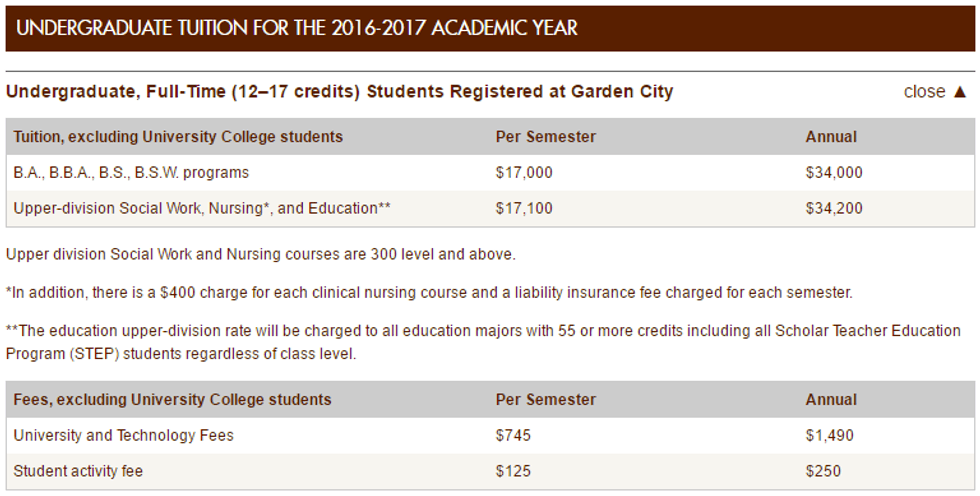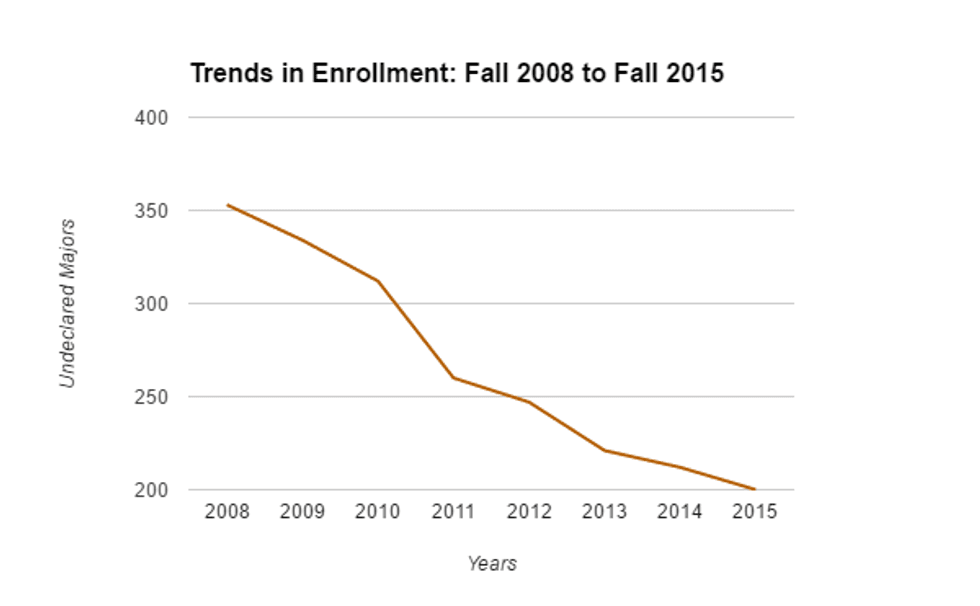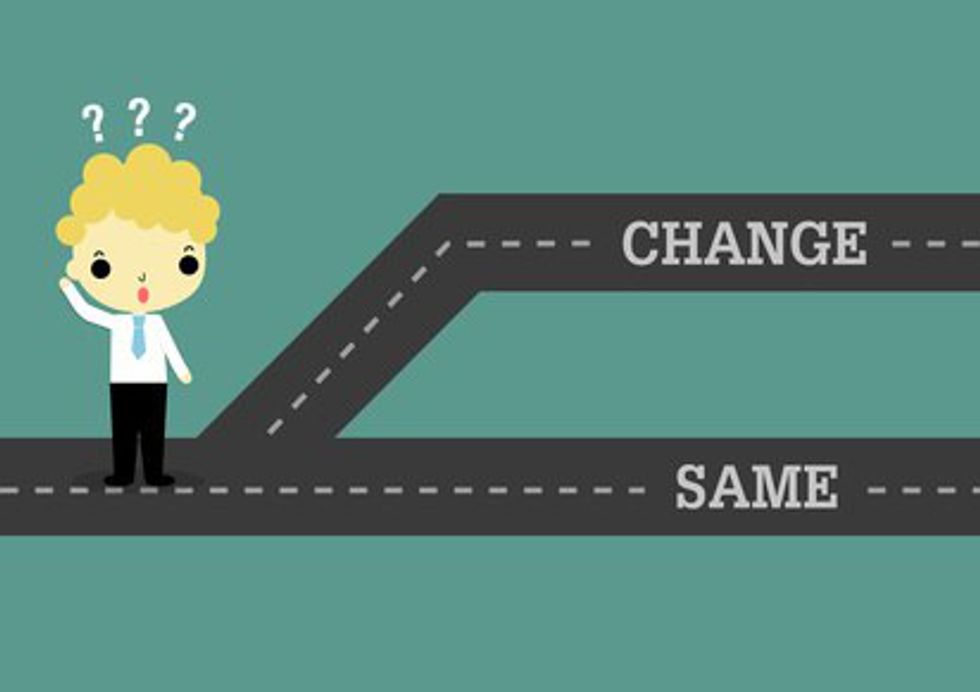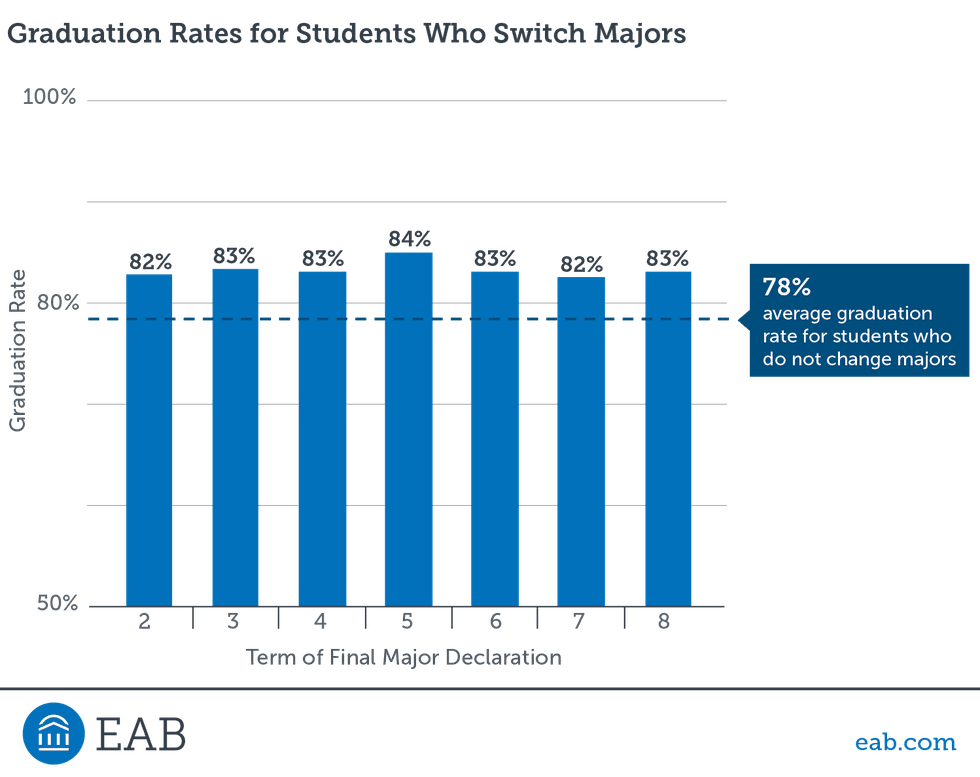Adelphi University students are increasingly deciding not to be undecided.
Over the past 10 years, the rate of enrolled undeclared majors at the school has steadily decreased, according to Senior Associate Provost Lester B. Baltimore and Executive Director of Academic Services Debra Kyriacou. But a little indecision may not be a bad thing, they add.
While reasons may vary by student, they believe the decreasing rates of undeclared majors has to do in large part with pressure put on the incoming freshmen by their parents to declare.
“I think it’s the parents and the cost of the education that they feel they need to,” said Kyriacou.
With a five percent tuition increase this academic year, Adelphi’s tuition now costs about $17,000 per semester and room, board and other fees can add thousands more to the bill. So, the longer a student takes to graduate, the more money it’ll cost them and their family.
“Some majors, if you don’t pick them at the beginning… if you’re not in it by your second semester, you’re either going to have to go to summer classes a couple of times or you’re going to take longer to graduate,” Baltimore said.
However, he cautions that hasty decisions can cost more in the long run.
“I think there’s a misguided notion that if you pick a major, you’ll graduate faster,” Baltimore said. “If you pick a major that you don’t like, it may do the opposite.”
Despite this, the total number of students enrolling as undeclared at Adelphi has decreased by 43.34 percent between the Fall 2008 and Fall 2015 semesters, according to the 2015 Adelphi University Data Book’s section on enrollment trends. When compared to the entirety of the enrolling class, only 11.4 percent of students came in as undeclared in Fall 2015, as opposed to the 16.7 percent in Fall 2008. Baltimore said that a few years prior to this data, the number of undeclared majors consisted of about 25 percent of the enrolling class.
Many students are now picking their major while in high school.
It’s “partly because of the pressure in high school to pick a college, in that you’re steered to pick a college that specializes in what you want,” said Joseph Lombardo, an Adelphi sophomore who enrolled as a biology major and changed to a mathematics major. “Also partly because of the pressure that comes with taking classes once you get there. A person only has so many general education classes before they have to take major classes.”
In addition to parents, school officials may also be pressuring students to pick a major sooner rather than later.
“In a lot of retention literature, there is a strong suggestion to get students to declare a major,” Baltimore said.
This pressure sometimes causes students to declare a major before they’re certain it’s the right fit for them.
As a result, many students do not stay in the major that they declare, as shown by Baltimore’s analysis of the student body. At orientation alone, he said. over 200 students who enrolled at Adelphi with a major changed it within that initial weekend.
Over the course of their studies, there has been a noticeable amount of students who switch majors, Baltimore said. Declared majors can be just as undecided as undeclared majors. Sometimes they simply want to avoid being labeled “undecided” and other times they discover the major they thought they liked turned out not to work.
Baltimore said, “There’s a lot more uncertainty than just those who know they’re uncertain.”
For those who dare to hold off on declaring a major, resistance eventually becomes futile. If one does not declare a major by their fifth semester or after the completion of 60 credits, Academic Services will put a registration block on her account. This means that the student cannot continue classes at Adelphi until they declare a major. This forces students to decide their major before their junior year which, for some, is difficult to do.
“I entered undeclared because I was torn between too many fields,” said Shannon Stewart, a theatre design and technology major. “I definitely felt the pressure to decide, especially out of fear of answering the dreaded question ‘what are you going to school for?’ and falling behind with requirements. I felt like something was wrong that I couldn’t decide.
“Honestly, sometimes I felt it would be better to be studying something I wasn’t 100 percent committed to, instead of studying ‘nothing.’ People want answers, and it’s scary not to know. But that’s not a shame because being undeclared is nothing to be afraid or ashamed of. I’m actually really glad I entered college the way I did because it helped me test the waters and figure things out.”
Baltimore says it’s better for students to wait to declare a major until they’re sure it’s what they want. If an incoming student doesn’t know where he would like her education to take her, she will most likely end up changing her major, regardless of whether that student already declared or not.
In order to help students find the right major, Baltimore recommends they go to Career Development Services. There, students can take diagnostic tests based on their interests. The results will help steer the undecideds in the right major choice direction.
“If there’s something you like, and you’re really comfortable in it, then there is an advantage to starting to make progress from the beginning," said Baltimore. "But if you don’t like it, you’re not going to do well in it.”
























